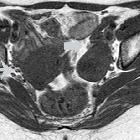Juvenile granulosa cell tumor (ovary)

Juvenile
granulosa cell tumor (ovary) • Juvenile granulosa cell tumor of the ovary (histology) - Ganzer Fall bei Radiopaedia
Juvenile granulosa cell tumors of the ovary (JGCT) are a less common subtype of granulosa cell tumor of the ovary (~5% of cases). They are classified as ovarian sex cord / stromal tumors.
Epidemiology
It typically occurs in premenarchal girls and young women. The mean age of presentation is 13 years.
Clinical presentation
JGCTs typically produce precocious puberty as a consequence of estrogen secretion. Rarely, they produce androgenic hormones.
Pathology
Associations
Radiographic features
Ultrasound
- appearance varies widely: may appear anywhere from a solid ovarian mass, to a multiloculated solid and cystic mass, to a purely cystic lesion
- varying degrees of hemorrhage and/or fibrosis
- typically unilateral
- less likely to have intracystic papillary projections than epithelial ovarian tumors
MRI
- "sponge-like" appearance
- solid areas of intermediate T2 signal intensity
- multilocular cystic component
- increased T1 signal in multiple locules, compatible with hemorrhage into the cystic locule
Uterine enlargement and/or endometrial thickening may also be present.
Treatment and prognosis
Most JGCTs (~90%) are detected at a low stage and surgery is curative. Higher stage disease has a worse prognosis and may require chemotherapy .
Inhibin can be used as a serum marker for diagnosis and post-treatment follow up.
See also
Siehe auch:
- Neoplasien des Ovars
- adulter Granulosazelltumor des Ovars
- Maffucci-Syndrom
- Granulosazelltumor
- Pubertas praecox
- Granulosazelltumor des Ovars
- ovarian sex cord-stromal tumours
und weiter:

 Assoziationen und Differentialdiagnosen zu juveniler Granulosazelltumor des Ovars:
Assoziationen und Differentialdiagnosen zu juveniler Granulosazelltumor des Ovars:




